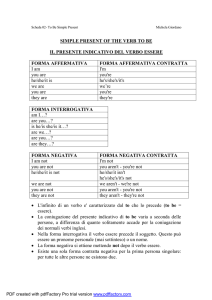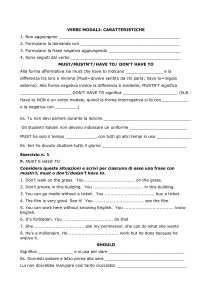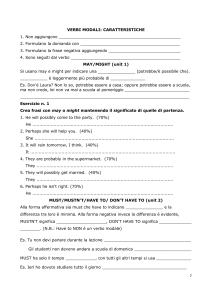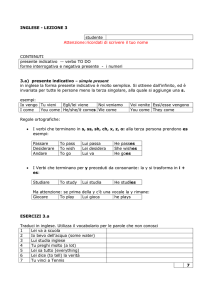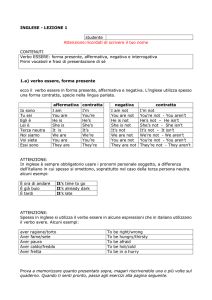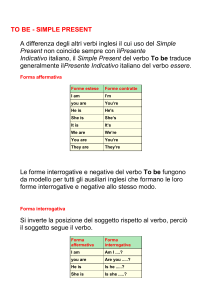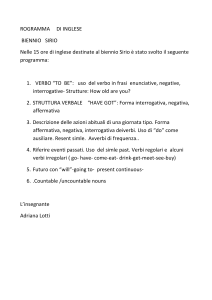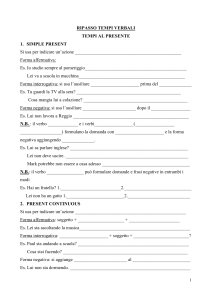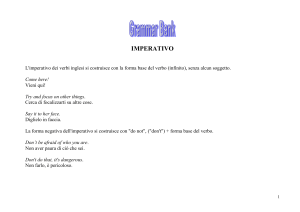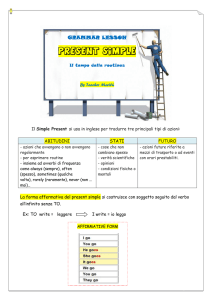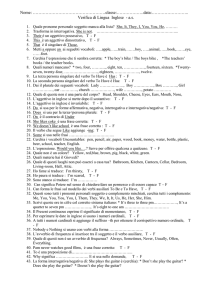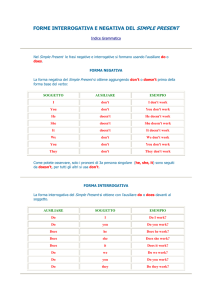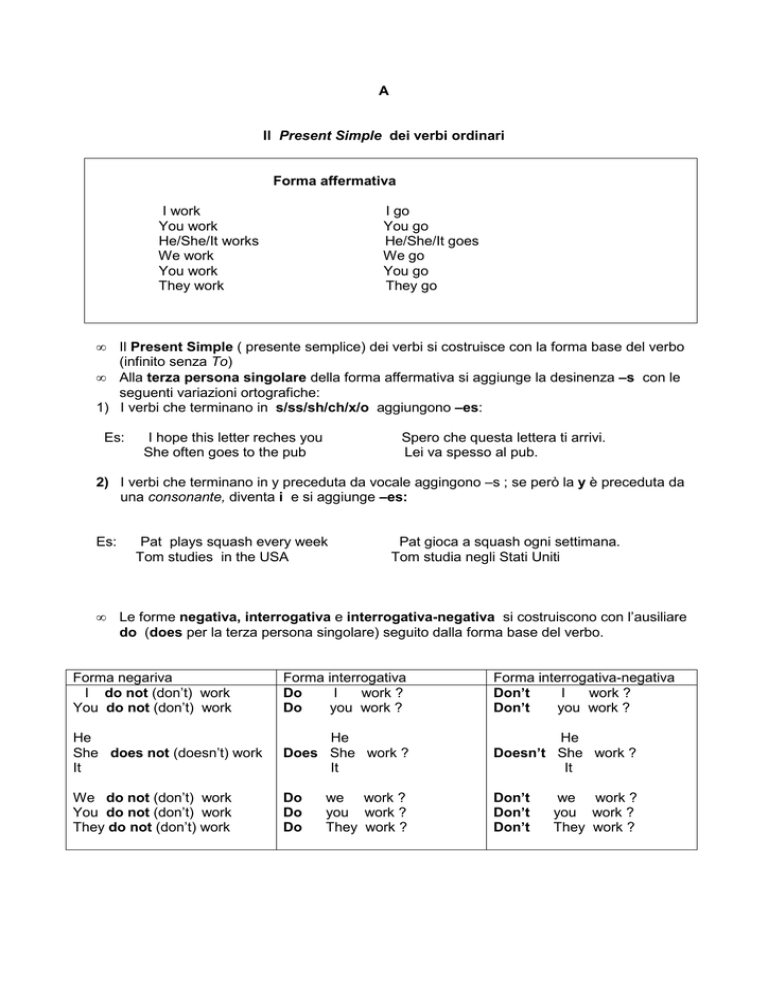
A
Il Present Simple dei verbi ordinari
Forma affermativa
I work
You work
He/She/It works
We work
You work
They work
I go
You go
He/She/It goes
We go
You go
They go
•
Il Present Simple ( presente semplice) dei verbi si costruisce con la forma base del verbo
(infinito senza To)
• Alla terza persona singolare della forma affermativa si aggiunge la desinenza –s con le
seguenti variazioni ortografiche:
1) I verbi che terminano in s/ss/sh/ch/x/o aggiungono –es:
Es:
I hope this letter reches you
She often goes to the pub
Spero che questa lettera ti arrivi.
Lei va spesso al pub.
2) I verbi che terminano in y preceduta da vocale aggingono –s ; se però la y è preceduta da
una consonante, diventa i e si aggiunge –es:
Es:
•
Pat plays squash every week
Tom studies in the USA
Pat gioca a squash ogni settimana.
Tom studia negli Stati Uniti
Le forme negativa, interrogativa e interrogativa-negativa si costruiscono con l’ausiliare
do (does per la terza persona singolare) seguito dalla forma base del verbo.
Forma negariva
I do not (don’t) work
You do not (don’t) work
Forma interrogativa
Do
I
work ?
Do
you work ?
Forma interrogativa-negativa
Don’t
I
work ?
Don’t
you work ?
He
She does not (doesn’t) work
It
He
Does She work ?
It
He
Doesn’t She work ?
It
We do not (don’t) work
You do not (don’t) work
They do not (don’t) work
Do
Do
Do
Don’t
Don’t
Don’t
we work ?
you work ?
They work ?
we work ?
you work ?
They work ?
•
Le risposte brevi si formano con l’ausiliare do/does, don’t/doesn’t.
Es: Do you live in Italy ? No, I don’t
Uso: Il present simple si usa:
Vivi in Italia? No.
•
Per parlare di un fatto che si ripete o ricorre abitualmente (spesso in presenza di avverbi di
frequenza come Usually, often, sometimes, every day/week…)
Es: Every morning I take the bus.
Ogni mattina prendo l’autobus.
I usually go to the cinema on Sunday
Di solito vado al cinema la Domenica
I always get up at 7
Mi alzo sempre alle 7.
• Per descrivere eventi, condizioni o verità che rimangono inalterate nel tempo
Es: She comes from Spain
Viene dalla Spagna
My parents live in Dublin
I miei genitori vivono a Dublino
The sun rises in the est
Il sole sorge ad est.
It rains a lot in England
Piove molto in Inghilterra.
•
Per indicare eventi in diretta, orari di spettacoli, orari di arrivo e partenza di mezzi di
trasporto ecc;
Es: Del Piero shoots and scores
Del Piero tira e segna.
The show starts at 7.30
Lo spettacolo comincia alle 7.30
The train for London leaves at 6.15pm
Il treno per Londra parte alle 18.15.
B
Il verbo “To Be”
Forma affermativa
I am
You are
He/she/it is
We are
You are
They are
Forma negativa
I am not
You are not (aren’t)
He/She/it is not (isn’t)
We are not (aren’t)
You are not (aren’t)
They are not (aren’t)
Forma interrogativa
Am I ? Yes, I am/No, I’m not
Are you..?
Is He/She/it..?
Are we..?
Are you…?
Are they..?
Il verbo “ To Have”
Forma affermativa
I have
You have
He/she/it has
We have
You have
They have
•
Forma negativa
I have not (haven’t)
You have not (haven’t)
He/she/it has (hasn’t)
We have not (haven’t)
You have not (haven’t
They have not (haven’t)
I verbo avere, quando indica possesso, viene seguito da got.
Es: I have got a beautiful car.
Ww have got lots of CDs
•
Es:
Forma interrogativa
Have I…?
Have you..?
Has He/she/it..?
Have we..?
Have you..?
Have they..?
Ho una bellissima macchina
Abbiamo molti Cd
Il verbo to have, oltre ad indicare possesso, viene usato anche con il significato di “fare”.
I have a shower every day
We have dinner at 7.30pm
Faccio la doccia tutti i giorni
Ceniamo alle 19.30
Completa il testo con il Present Simple dei verbi nel riquadro
Go (x6)
Live
Work
Have ( x3)
Study
Watch
Get up (x2)
Finish
John…………………….. in Oxford with his parents, his sister, Anna and their cat, Blondie.
John…………………………languages at university and Anna …………………..to secondary
school. Every morning John ………………………..at 7.30, …………………….. breakfast, a
shower, and then …………………….to University. He usually………………….a sandwich for
lunch. In the afternoon he……………….in the local library. He ………………… to work at 2
o’clock. He …………………….work at 5.30.
Then John ……………………home and
……………………………..dinner with his family. Later he ……………………… TV and then he
…………………to bed early because he’s very tired. At weekends he ………………… late
and………………..out with his friends.

